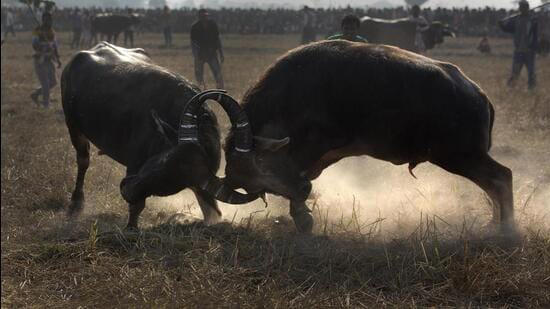The Gauhati High Court has banned buffalo fights and bulbul fights in Assam, effectively striking down the government’s Standard Operating Procedure (SOP) that permitted such activities under certain conditions. The court’s decision is a significant step toward enforcing laws that prohibit cruelty to animals and aligns with broader national and international efforts to protect animal welfare.
The Traditional Practices
Buffalo fights and bulbul fights have long been associated with Assamese culture and are commonly held during the harvest festival of Magh Bihu, celebrated in January. These events attract large crowds and are often viewed as a symbol of community celebration and camaraderie. Buffalo fights typically involve two bulls pitted against each other in a display of strength and endurance, while bulbul fights involve trained songbirds locked in combat.
However, animal rights activists and legal experts have repeatedly raised concerns about the ethical and legal implications of such events. Critics argue that these practices subject animals to unnecessary suffering, violating the Prevention of Cruelty to Animals Act, 1960. Despite these concerns, the Assam government had issued an SOP allowing these events to continue under the guise of preserving cultural heritage, provided certain guidelines were followed.
The Court’s Ruling
In its judgment, the Gauhati High Court categorically ruled that cultural traditions cannot justify cruelty to animals. The court emphasized that the Prevention of Cruelty to Animals Act is a binding law that takes precedence over state-issued guidelines or SOPs that attempt to circumvent its provisions. The court noted that no tradition or cultural practice should involve the infliction of pain or suffering on sentient beings.
The court’s ruling also highlighted that allowing such events under regulated conditions, as outlined in the SOP, does not mitigate the inherent cruelty involved. The court struck down the SOP as unconstitutional and incompatible with existing animal protection laws.
Reaction to the Ruling
The court’s decision has elicited mixed reactions across Assam. Animal rights organizations have welcomed the ruling, viewing it as a victory for ethical treatment and animal welfare. Organizations like People for Animals (PFA) and the Humane Society International (HSI) have applauded the court’s firm stand against animal cruelty.
“This judgment is a monumental step in the right direction,” said a spokesperson for PFA. “It sends a strong message that cultural traditions must evolve to align with modern ethical standards and legal frameworks.”
However, the ruling has also sparked disappointment and resistance among sections of the Assamese populace who view these events as an integral part of their cultural identity. Some cultural and community leaders have expressed concerns that the ban undermines traditional practices that have been celebrated for centuries.
“Magh Bihu is incomplete without these age-old traditions,” said a community leader from Guwahati. “While we understand the need for animal welfare, outright bans erode the essence of our culture. A balanced approach could have been explored.”
The Government’s Stance
The Assam government is yet to officially respond to the High Court’s decision. However, sources suggest that the government might consider filing an appeal to review the ruling. In the past, the state has defended these events as a part of Assamese heritage, arguing that regulated frameworks could ensure minimal harm to animals.
Despite such arguments, legal experts point out that any attempt to dilute the court’s order is unlikely to hold up, given the clear provisions of the Prevention of Cruelty to Animals Act and previous Supreme Court rulings on similar issues.
Broader Implications
The Gauhati High Court’s ruling is significant not only for Assam but also for other regions in India where similar practices exist. It underscores the judiciary’s commitment to enforcing animal welfare laws and sets a precedent for addressing conflicts between cultural practices and legal frameworks.
This decision also comes amid growing global attention on the ethical treatment of animals, with many countries implementing stricter laws against practices that involve cruelty. The court’s ruling could inspire further reforms in India, encouraging states to reassess traditional practices that involve animal exploitation.
Conclusion
The Gauhati High Court’s decision to ban buffalo and bulbul fights in Assam marks a turning point in the ongoing debate between cultural heritage and animal rights. While the ruling has been lauded by animal welfare advocates, it also highlights the need for dialogue and education to ensure that cultural practices evolve in harmony with ethical and legal standards.
As Assam navigates this cultural and legal crossroads, the court’s judgment serves as a reminder that compassion and humanity must guide societal traditions, ensuring that the rights of all living beings are respected.


